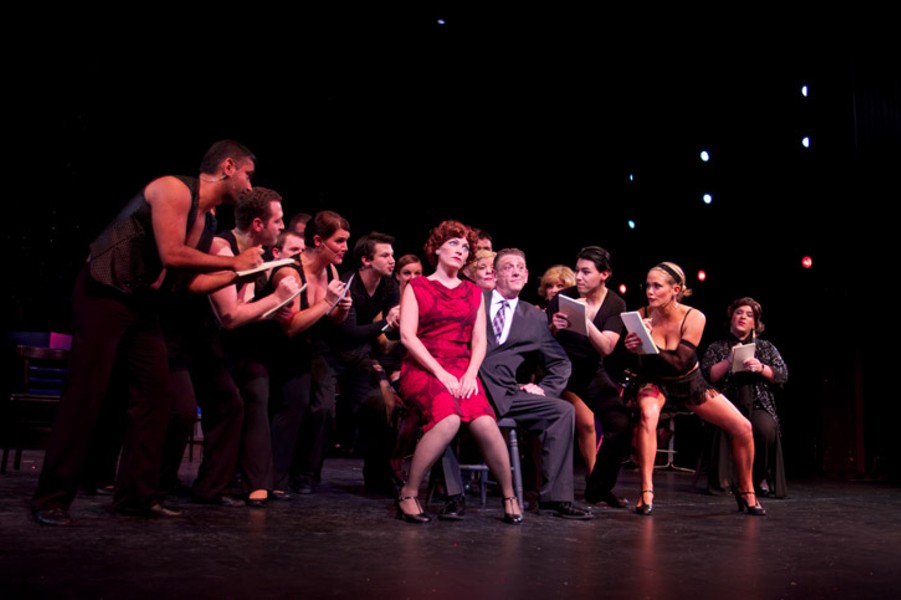John Kander and Fred Ebb's musical "Chicago" has been popular since it debuted on Broadway in 1975, but it wasn't fully cemented in the mainstream consciousness until its 2002 Oscar-winning film adaptation. That makes the show a bit of a double-edged sword for local theater troupes. The good news is, it practically sells itself — most Americans are familiar with the story of murderous, melodious chorines and those undeniable songs. The bad news is, most people have the recent film firmly etched in their minds, leaving live productions with big bowler hats to fill.
So it is a testament to the strength of Pittsford Musicals, and to Rochester's community-theater scene in general, that the company is currently putting on such a successful staging of "Chicago" at RIT's Panara Theatre (great venue, by the way). Three especially strong leads, a more-than-solid ensemble, and lots of little surprises make this a show worth seeing, even for diehard fans of the film.
The gist: It's Chicago in the 1920's. The booze is flowing, the morals are loose. Roxie Hart's side piece dumps her, and she responds by shooting him dead and trying to pin the murder on her putz husband, Amos. Roxie soon finds herself in prison with a bunch of other deadly dames, including double-homicide-dealing Vaudevillian Velma Kelly. But more than that, Roxie finds herself all over the papers due to the salacious nature of her case. She finally has the fame she's always desired, and all she has to do to embrace it is beat that pesky murder charge. She hires slick defense attorney Billy Flynn, and the two conspire to manipulate the press, the jury, and of course the truth so that Roxie can live that great, American dream: to be rich and famous despite having little or no talent.
You cannot pull off "Chicago" without equally strong actors in the roles of Roxie and Velma, and director Lorie Dengler Dewey has found them in Adell Cuminale Cecconi and Abby Adair Reinhard, respectively. What's especially impressive is that the two women — and Roy Wise in the lead male role of Billy Flynn — bring a different flavor to the characters than you might expect.
As Velma, Reinhard takes immediate control of the show in "All That Jazz." She's a talented vocalist, capable of both belting the big notes and emoting convincingly in the smaller moments, as in the coda to "I Can't Do It Alone." Reinhard also appears to be 90 percent arms and legs; her long, lithe limbs and graceful movements make her a striking dancer. Her Velma is a bit more of a bitter kitten, but still sexy and likable.
Cecconi's Roxie took a few numbers to warm up the night I saw the production: her breathy rendition of "Funny Honey" and early scenes hovered on the surface of the character instead of delving fully inside it. But by the time she got to "We Both Reached for the Gun" and "Roxie," she was on fire, singing and dancing with megawatt intensity. This may have been an intentional acting direction — like her character, Cecconi blossomed throughout the show. Her charming, almost giddy turn as Roxie reminded me of Kristin Chenoweth's character from the late, lamented "Pushing Daisies."
Roy Wise's booming voice is a fantastic fit for Billy Flynn's big songs. Beyond that, his snark-filled delivery of even the most throwaway lines proved fresh and funny. The secondary leads all do excellent work, including Eric Traugott as the crowd-pleasing Amos Hart and Mary P. DuBois as the corrupt Mama Morton. M. Ciaccia serves up Patti LuPone Realness and some serious vocal acrobatics in the role of Mary Sunshine, and Kapil Dass cuts a fine figure as the MC.
Pittsford Musicals historically has had strong ensembles, and that's no exception here. I can't even imagine the amount of rehearsal time that must have gone into some of those big group numbers, because songs like "We Both Reached for the Gun," "Roxie," and "Me and My Baby" were very nearly flawless. The challenging "Cell Block Tango" was well executed, with each of the six merry murderesses making the most of their individual bits, and "Razzle Dazzle" became a circus, with little side acts all over the stage.
Singing is one thing, but dancing is — let's be honest — typically the death of many a community-theater musical number. That's especially true when you're taking on a show like "Chicago," associated with iconic steps by Bob Fosse. Choreographer Shelly West Thompson attacked the challenge, and has created dynamic, multifaceted sequences that offer something different for each number. And lest I forget, Harold McAulliffe leads a terrific pit orchestra.
Most of the criticism for this production comes down to the nittiest of picks. Timing repeatedly popped up as an issue, everything from some slightly too long scene changes to dancers not quite being in synch to rhythms occasionally falling off in a few songs. Additionally, in Act 2 the show struggled to maintain the intensity that it built up over the second half of the very strong first act.
Lastly, some members of the ensemble, and even one or two of the secondary leads, occasionally looked uncomfortable with their characters' actions on stage. It's understandable. Anyone might grimace when being asked to grind his hips in front of an audience that possibly contains his loan officer, or to slide across the floor in a low-cut top in front of her kid's second-grade teacher. But one of the strengths of "Chicago" is how effectively and immediately it transports us back to the 1920's, a world full of booze hounds and jazz sluts. The audience enjoys that suspension of reality, and the actors should, too. So to the cast I say: embrace your inner jazz slut, and work those fishnets with abandon.
